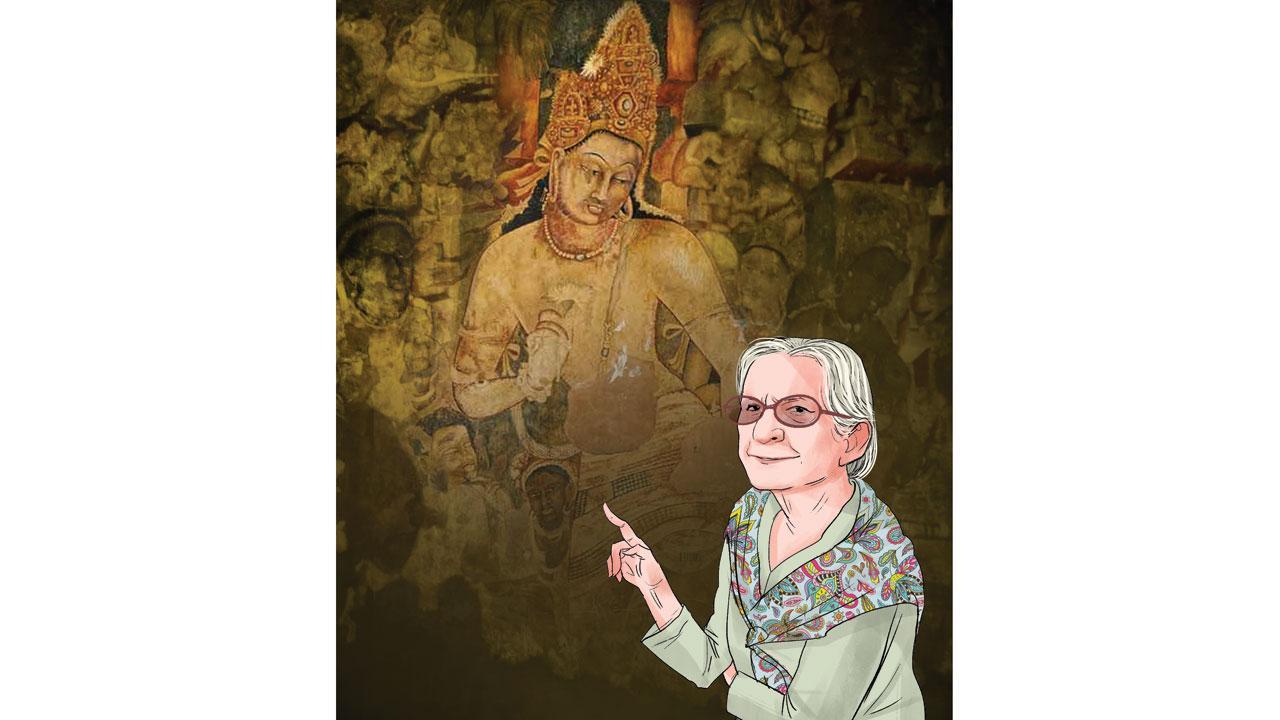Amma readily agreed to the trip, trusting that Akku and I would sort out whatever needed to be sorted out.

Illustration/Uday Mohite
![]() A few months ago, Amma—Indu Shedde—who is 96— travelled to the Ajanta Caves in Maharashtra. Whaaat? True, it’s not a place I would suggest for a nonagenarian’s holiday—there are a series of 30 caves with steep, narrow, stone steps, accessed via bridges across streams, with no wheelchair access; besides, it was the rainy season. But the wisdom of years has taught me to avoid arguing with my older sister Sarayu Kamat (Akku). She obviously had a plan; besides, it was her holiday treat for Amma and me. The Ajanta Caves are a UNESCO World Heritage Site, spectacular, rock-cut Buddhist caves that include statues, murals, chaityas (temple) and viharas (monastery), carved between the second century BCE, during the Satavahana Dynasty and fifth century CE, during the reign of the Vakatakas.
A few months ago, Amma—Indu Shedde—who is 96— travelled to the Ajanta Caves in Maharashtra. Whaaat? True, it’s not a place I would suggest for a nonagenarian’s holiday—there are a series of 30 caves with steep, narrow, stone steps, accessed via bridges across streams, with no wheelchair access; besides, it was the rainy season. But the wisdom of years has taught me to avoid arguing with my older sister Sarayu Kamat (Akku). She obviously had a plan; besides, it was her holiday treat for Amma and me. The Ajanta Caves are a UNESCO World Heritage Site, spectacular, rock-cut Buddhist caves that include statues, murals, chaityas (temple) and viharas (monastery), carved between the second century BCE, during the Satavahana Dynasty and fifth century CE, during the reign of the Vakatakas.
ADVERTISEMENT
Amma readily agreed to the trip, trusting that Akku and I would sort out whatever needed to be sorted out. I had already taken her to Benares earlier this year. It was a “test drive” of sorts, in which I had made wheelchair arrangements for her for most places, and Amma exhibited a joyous enthusiasm—visiting the Kashi Vishwanath temple, watching the Ganga aarti from a boat, hogging pyaaz kachori, aloo puri and jaleba with me, paan Benareswala and the divine mishrambu drink. Flatly refusing to nap in the searing afternoons, she insisted on schlepping to Sarnath with me, and accompanying me to see weavers weave magnificent Banarasi saris. It was as if with this one trip, she was making up for 20 years of barely leaving her room, in a tearing hurry. Likewise, Akku had set aside two days for the Ajanta Caves, but Amma adored them so much, and had so many questions for the guide, she wanted to visit it for one more day, so we extended the trip to three days. We had two experienced guides, mainly Shubha Khandekar and also Abdul Nasir Mohammadi.
It turned out the Ajanta Caves had “doli” access for Amma: in fact, she sat on a wooden chair with two long wooden poles crudely clamped at arm rest level, with four men carrying the poles on their shoulders, two in front, two behind. I gave her a floppy hat to shade her from the sun, and when the quartet carried her to and from the caves, I remembered Miss Adela Quested and the elderly Mrs Moore at the Marabar Caves from EM Forster’s A Passage to India.
Amma loved many things at Ajanta, including the glorious murals of Padmapani and Vajrapani, and had many questions. How did they make all those colours from nature—maroon, black, yellow, blue? (from minerals). How did they get enough light to paint inside the cave’s walls and ceilings? And so on. For me, it was also a shocking reminder that the gorgeous, feminine, long haired, bejewelled Padmapani “lotus bearer”—with earrings, necklace, bangles, arm bazuband—slender waisted, full-lipped, in tribhanga pose, sinuously monobrowed beauty—is a man. In fact, Padmapani is a manifestation of Avalokitesvara, the bodhisattva of infinite compassion—it is fascinating how compassion can feminise a man and disarm him, at least in art. In fact, the Chinese version of Avalokitesvara is Guanyin, the Goddess of Mercy, actually a woman with a lotus. Amma was also very taken up with the magnificent sculpture of Buddha’s Mahaparinirvana. A massive horizontal stone Buddha lies on his side in calm repose, his palm tucked under his cheek, his pillow squished with the weight of his head.
The English name for this sculpture is Reclining Buddha, which doesn’t convey half the meaning of him attaining Mahaparinirvana, having passed away and attained eternal bliss. What is remarkable is, Buddha lies in a double frieze: below him, sorrowful followers mourn his death, while above him, celestial musicians celebrate his imminent arrival. Everything is relative, it seems to emphasise. Ditto for all of us.
Meenakshi Shedde is India and South Asia Delegate to the Berlin International Film Festival, National Award-winning critic, curator to festivals worldwide and journalist.
Reach her at meenakshi.shedde@mid-day.com
 Subscribe today by clicking the link and stay updated with the latest news!" Click here!
Subscribe today by clicking the link and stay updated with the latest news!" Click here!







